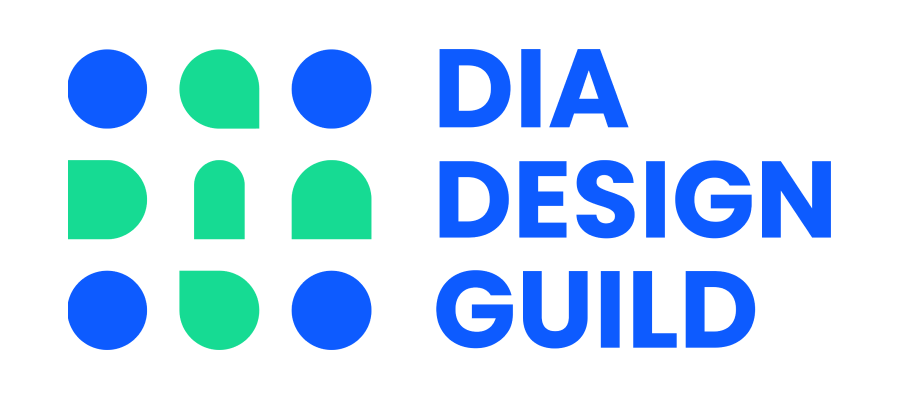Code of Conduct
Our Pledge
DIA Design Guild is led by Grace Lau, co-founder and lead UX architect. The Apprentice Program and social events (virtual and in-person) are designed in collaboration and partnership with the affiliated mentors and apprentices.
We as members, contributors, and leaders pledge to make participation in our community a harassment-free experience for everyone, regardless of age, body size, visible or invisible disability, ethnicity, sex characteristics, gender identity and expression, level of experience, education, socioeconomic status, nationality, personal appearance, race, caste, color, religion, or sexual identity and orientation.
We pledge to act and interact in ways that contribute to an open, welcoming, diverse, inclusive, and healthy community. Harassment of community participants in any form will not be tolerated. Participants include all apprentices, as well as any volunteers, guests, mentors, or members of online communities related to the DIA Design Guild, now or in the future.
This code of conduct applies to everyone who participates in the apprentice program, both during the live workshops and throughout online discussion and interactions. Anyone who violates this code of conduct may be sanctioned or expelled from an event or the program at Grace’s discretion. Everyone is responsible for knowing and abiding by these rules.
Given the nature of this community, everyone is asked to assume a default expectation of privacy with regards to the stories and personal details that participants may share during the course of this community.
Our Standards
Remember that, in the physical and online worlds, we all have boundaries. Be respectful of those in others.
Examples of behavior that contributes to a positive environment for our community include:
- Asking questions before making assumptions about another person or situation
- Demonstrating empathy and kindness toward other people
- Being respectful of differing opinions, viewpoints, and experiences
- Giving and gracefully accepting constructive feedback
- Accepting responsibility and apologizing to those affected by our mistakes, and learning from the experience
- Focusing on what is best not just for us as individuals, but for the overall community
Examples of unacceptable behavior include:
- The use of sexualized language or imagery, and sexual attention or advances of any kind
- Trolling, insulting or derogatory comments, and personal or political attacks
- Public or private harassment
- Publishing others' private information, such as a physical or email address, without their explicit permission
- Offensive comments related to gender, gender identity and expression, sexual orientation, disability, mental illness, neuro(a)tipicality, physical appearance, body size, age, race, or religion
- Other conduct which could reasonably be considered inappropriate in a professional setting
Enforcement Responsibilities
Community leaders such as mentors and staff are responsible for clarifying and enforcing our standards of acceptable behavior and will take appropriate and fair corrective action in response to any behavior that they deem inappropriate, threatening, offensive, or harmful.
Community leaders have the right and responsibility to remove, edit, or reject comments, commits, code, wiki edits, issues, and other contributions that are not aligned to this Code of Conduct, and will communicate reasons for moderation decisions when appropriate.
Scope
This Code of Conduct applies within all community spaces, and also applies when an individual is officially representing the community in public spaces.
Examples of representing our community include using an official email address, posting via an official social media account, or acting as an appointed representative at an online or offline event.
Enforcement
If you are being harassed by a participant, notice that someone else is being harassed, or have any other concerns, please let us know by emailing safety@diadesign.io or submitting an anonymous message at https://forms.diadesign.io/safety.
All complaints will be reviewed and investigated promptly and fairly. All community leaders are obligated to respect the privacy and security of the reporter of any incident.
Enforcement Guidelines
Community leaders will follow these Community Impact Guidelines in determining the consequences for any action they deem in violation of this Code of Conduct:
1. Correction
Community Impact: Use of inappropriate language or other behavior deemed unprofessional or unwelcome in the community.
Consequence: A private, written warning from community leaders, providing clarity around the nature of the violation and an explanation of why the behavior was inappropriate. A public apology may be requested.
2. Warning
Community Impact: A violation through a single incident or series of actions.
Consequence: A warning with consequences for continued behavior. No interaction with the people involved, including unsolicited interaction with those enforcing the Code of Conduct, for a specified period of time. This includes avoiding interactions in community spaces as well as external channels like social media. Violating these terms may lead to a temporary or permanent ban.
3. Temporary Ban
Community Impact: A serious violation of community standards, including sustained inappropriate behavior.
Consequence: A temporary ban from any sort of interaction or public communication with the community for a specified period of time. No public or private interaction with the people involved, including unsolicited interaction with those enforcing the Code of Conduct, is allowed during this period.
Violating these terms may lead to a permanent ban.
4. Permanent Ban
Community Impact: Demonstrating a pattern of violation of community standards, including sustained inappropriate behavior, harassment of an individual, or aggression toward or disparagement of classes of individuals.
Consequence: A permanent ban from any sort of public interaction within the community.
Privacy
Participants are asked to treat all anecdotes, stories, and details shared by other participants as private information. Do not share anyone else’s story without their permission, even if you anonymize the details. Everyone’s story belongs to them.
Do not use any information that participants share to solicit them without their permission (e.g. for a job opportunity) or share their information or employment status with any third-parties without their permission.
Attribution
This Code of Conduct is inspired by Mozilla CoC, Contributor Covenant, Geek Feminism wiki.
This is a living document and will be reviewed and updated on a regular basis. Last updated on 12 Feb 2023.
